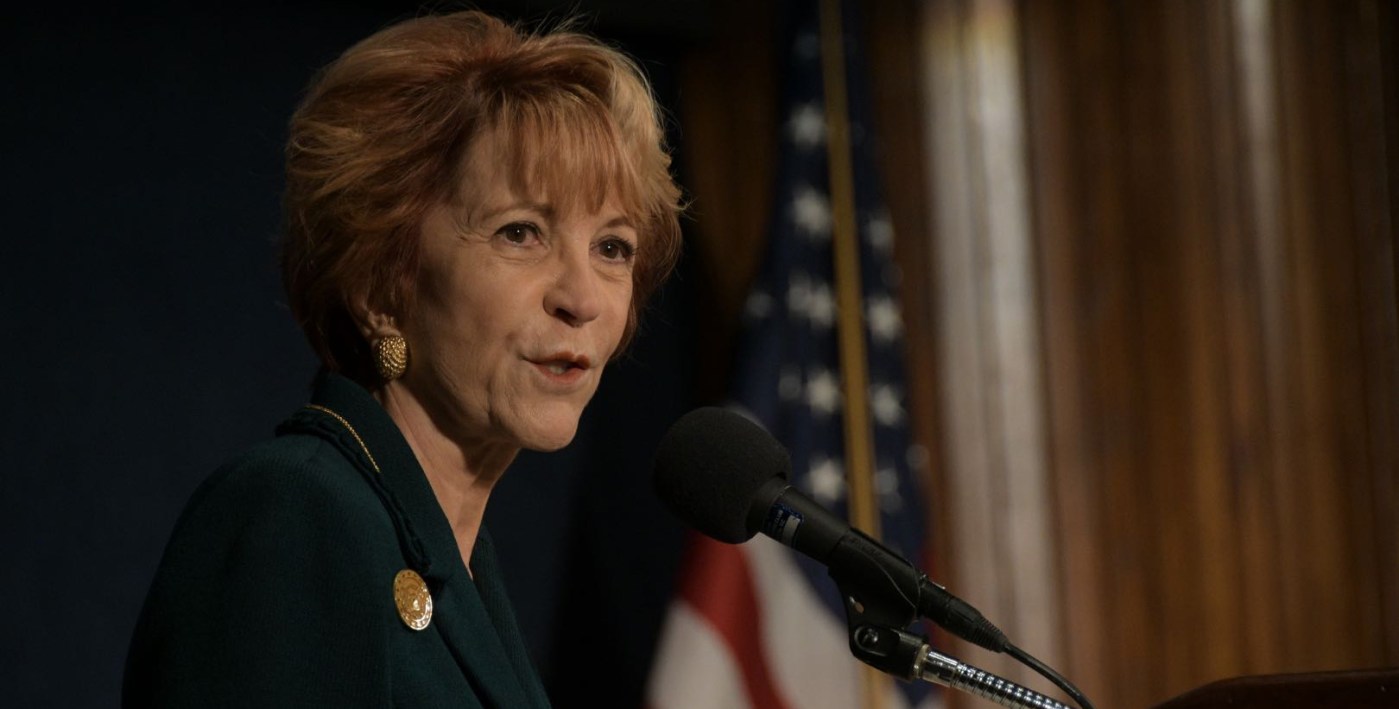Including Caregivers into Veterans’ medical teams was the focus of a launch event between VA and the Elizabeth Dole Foundation Jan. 31 at the National Press Club in Washington, D.C.
The Campaign for Inclusive Care Academy is a groundbreaking model for health care systems nationwide, said Sen. Elizabeth Dole, herself a Caregiver for her husband, Sen. Bob Dole.

Sen. Elizabeth Dole speaks at the Campaign for Inclusive Care Academy event Jan. 31 at the National Press Club in Washington, D.C.
“We want to equip the doctors, nurses, social workers and frontline medical personnel across the entire VA health system with the latest strategies for integrating Caregivers into their Veterans’ medical teams,” she said.
The training focuses on Caregivers and Veterans receiving geriatric, polytrauma and traumatic brain injury care. Providers learn about three topics: the Caregiver’s journey, the value of clear and mutual communication, and Veterans Health Administration privacy policies. The training fits into VA’s mission to care for those who have borne the battle, said VA Chief Veterans Experience Officer Dr. Lynda Davis.
“This commitment to customer service reflects our longstanding held culture referred to in the I CARE values that the VA has,” Davis–herself a Veteran Caregiver—said. The I CARE acronym stands for Integrity, Commitment, Advocacy, Respect, and Excellence.
Previously, including Caregivers into Veteran care wasn’t consistent. Under the new program, VA medical personnel will ask Veterans if they want a Caregiver included in medical care.
“We all know we sit in with our kids and hear what the doctor has to say, but when you’re an adult, nobody says, ‘Do you need your husband or wife to sit in?’” said Lisa Pape, deputy chief officer of Patient Care Services at VA. She said the VA will now ask that question because Caregivers are with Veterans all the time.
“Most of the advocates for this are the Veterans who want that family member engaged,” said Steven Schwab, Elizabeth Dole Foundation chief executive officer. He said the new program should set a new standard for VA and civilian health care. Schwab said major health care systems such as the Cleveland Clinic, Mayo Clinic and Sanford Health are already following the program.
The program will start with three Veterans Integrated Service Networks, or VISNs. The three are VISN 10, headquartered in Ohio and covering parts of the Midwest; VISN 17, headquartered in Texas; and VISN 20, headquartered in Washington and covering the Pacific Northwest and Alaska. In roughly two years, the program will expand to all VA facilities.
The Campaign for Inclusive Care Academy has several goals. One is helping VA identify Caregivers and make them part of the team. Equipping Caregivers to promote more positive clinical outcomes is another goal. The program also aims to enhance VA’s Choose Home program and improve care in the home. The last goal is to ensure that the information VA receives about Caregivers is respected and remains private.
Background
VA started meeting with the Veterans’ Family, Caregiver, and Survivor Advisory Committee in October 2017. In September 2018, the Elizabeth Dole Center of Excellence for Veteran and Caregiver Research started. The Joint Campaign for Inclusive Care launched in October 2019.
Research published in the June 2019 edition of the journal Health Affairs showed VA and the Elizabeth Dole Foundation’s progress on a Veteran’s health care treatment.
The report was “Including Family Caregivers in Seriously Ill Veterans’ Care: A Mixed-Methods Study.” Duke University led the research and emphasized caregiver inclusion identified in the VA – Elizabeth Dole Foundation’s Campaign for Inclusive Care, which strengthens health care and is a model for improving care in the private sector. The Campaign for Inclusive Care is one of several initiatives and programs through which VA supports Veterans’ caregivers.
Topics in this story
More Stories
Summer Sports Clinic is a rehabilitative and educational sporting event for eligible Veterans with a range of disabilities.
Caregivers can reduce loneliness and isolation by connecting with the Caregiver Support Program.
Report examines the input of over 7,000 women Veterans: They are happier with VA health care than ever before.







I am currently taking care of my husband who had a stroke in June 2019. The year before that he fell completing the stress fracture break, which actually took two years to get approval for the surgery. He fell completing the break, in 2018. Making it an emergency and taken to our local hospital. It took several visits to Tuskegee (about 70 miles away) He is 87 now and I, 71. He has done pretty well with recovery, but, I am pushed to keep everything done at our home, fixing meals, keeping the house neat and clean, making and keeping appointments, trying to keep his medications in order and ready for him to take when it’s time. Shopping to get things we need at home,. I take care of paying the bills. I really don’t think he could handle this as I have always taken care of this since were married twenty-three years ago. It’s now tax time again. The past two years I’ve had to get extensions. Didn’t get them done till October. I try to take him shopping in places like Sam’s or Walmart where he can hold on to the buggy. He’s not really steady on his feet and sometimes has trouble with dressing. I never want to discourage him because he tries really hard and I do help him when I see that he is having troublle
But ONLY for those Veterans who served AFTER 911.
The rest of us with our Caregivers can go and take a long walk off a short pier because we don’t mean shit to our government.
I have been saying this exact same thing. I am my husband’s caregiver. He’s been deemed Totally & Permanently Disabled by the VA, as well as Unemployable. Because he is pre-9/11, I can’t get shit in the way of caregiver supports. I’d like to know why it was so much braver to be enlisted post-9/11 than in any other era. By the way, I’m also a veteran (we actually met in AIT). We’re both Desert Storm era, but we were never deployed.
At our small VAMC in East Tennessee we have been running a monthly two-hour class on kidney disease for Veterans and their family members/caregivers which is held both face-to-face and via telehealth to all six of our CBOC’s. The family plays a crucial role in helping Veterans with progressive chronic kidney disease and risk factors for further progression. Making the dietary and lifestyle changes needed to slow or prevent progression of kidney function loss is near-impossible without the full commitment and backing of the caregivers and family members who prepare the food and help create the home environment. We have seen the benefits such a program can convey to Veterans. Nobody’s wants to spend the latter years of their lives on three-time-a-week dialysis. Getting caregivers and family involved in helping the Veterans to avoid that fate is a poster-child for the Administration’s Advancing American Kidney Health Initiative, and we are proud to be running such a program!
My husband has 100% Disability rating and is now Permanent and has been officially Unemployable. He has severe PTSD from his tour in Iraq. I am a nurse but haven’t been able to work due to my husband’s needs. I have applied twice at the Syracuse, NY VA and both times I was denied. I need some guidance please. If I felt my husband was safe and taking care of himself then I WOULD be working, but it’s not what is best for him. I am given the reason for the denial and asked for an appeal but was never given info to file. I do not feel it is in my husband’s best interest to stay home for 10 hrs a day while I go take care of others. What is going on with this system??
I would like someone to help me get information concerning the situation with me developing fluid on the brain after getting out of the Army. I was told by the doctor’s in Miami, FL Veterans Hospital the the cause was due to inhaling fumes. The only fumes, etc. that I was ever exposed to was in the Army while working in Artillery. My test, labs and everything was supposed to have been sent to California for the reason why I would develop fluid on the brain but to date, no one has told me anything. This took place August of 1993, all of a sudden my Miami medical records have been misplace by the Miami’s Veterans Hospital and I don’t know how to contact anyone to find them, nor do I know how to get untouched with California to get my results. Can someone please help me as to who and where I can get information.
Need to know more. I am a retired RN living with a veteran who is functional now but may need more help in the future. I want to be able to keep up with the current practices and standards as we plan to stay at home as long as possible supporting each other.
Is there or will there be any monetary compensation for a spouse being a full-time caregiver for a veteran? I’m having difficulty balancing my time at work with my caregiver responsibilities, but we need the income from my job. It would be awesome if I could be paid for being my husband’s caregiver. Then, I wouldn’t HAVE to keep my job and could commit more time to caring for him.
More information on the program is at https://www.va.gov/health-care/family-caregiver-benefits/comprehensive-assistance/.
Here is some info on a veterans benefit to look at:
NON-SERVICE CONNECTED DISABILITY PENSION WITH AID AND ATTENDANCE
Provides a tax-free pension to service members and surviving spouses to help with assisted living, in-home care or nursing home expenses.
Lots of red tape and hoops to jump through.
My dad needs. Handy cap.van to go to Apts
I am a disabled veteran my self and could help those needing supplemental and ICU care from home. I was a thirty two a year Paramedic who also worked in the ICU at Elmendorf AFB four good years. I no longer certifcations I ACLS, PALs, and NRP. I have a few debilitating condions my self, but feel i could help in some manner for the vets i n my immediate are of Seward,AK. Please let me know if there’s something i could.
Thank you,
Major Randall Rydberg
What about Veterans who have become care givers? nada